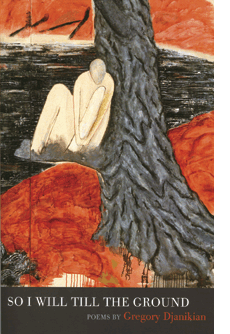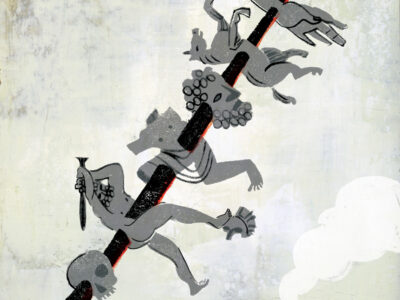Poems of heritage and history.

SO I WILL TILL THE GROUND
By Gregory Djanikian C’71, faculty.
Carnegie Mellon University Press, 2006. $14.95.
By Beth Kephart | It was late in the afternoon the first time I ever heard a Gregory Djanikian poem. I was alone at my computer, sifting through that matchless trove of literary recordings that is known as PENNsound, and a poem listed as “Something Unusual” had, for whatever reason, caught my attention. I accessed the MP3 file and closed my eyes. In through the stillness of that afternoon drifted words both soothing and unnerving, galvanizing and calm. Words that straightened my spine: When it was clear that their marriage could not continue, when the accusations had led to punishments, silences, illicit calls, closed doors, and would not be commuted …
I couldn’t see the poem, could only hear it. It was all of 1.59 minutes long, and it was a story perfectly told—about a broken marriage and an exploded furnace, about ruins and declarations, about exhaustion, fervor, and essential emptiness. I remember feeling hollowed out, the way one does in the presence of some felt truth. I remember feeling exhilarated—not just about the unassailable quality of the poem, but about the mind of the man who was its author.
That same feeling attended my reading of Djanikian’s newest collection, So I Will Till the Ground, a book so personal and accessible that it reads like memoir, a book so attentive to the hush and promise of language that it will forever be classified as poetry. Ground is a book about heritage and history. It is about surviving among and despite the ghosts of those denied that privilege. It is about the rivers that etch themselves into the earth, and about the rivers—backwards flowing, forward surging—of time.
Born to an Armenian family in Alexandria, Egypt, Djanikian, who directs Penn’s creative-writing program, knows of what he writes. His poems are grounded. Even if he was not in Ottoman Turkey in 1915, when as many as 1.5 million Armenians became the victims of mass murder, he remembers for us what we have managed to banish from our collective concerns, elide from our history texts. He captures the ignominy of the genocide in measured but indelible lines. He tells the story of many through the retrospect of one.
“The Aestheticians of Genocide,” the first poem in the collection, establishes the poet as both instructor and conscience, as a somehow solicitous arbiter of unimaginable tragedy:
The trick is to avoid excesses
of horror so as not to scorch the mind
and strike it dumb, though grief may yowl
in the dirt and the villages burn.
For instance, if we were to say
they brought the men to the square
and bound them to the posts and one
by one gouged out their eyes,
how many of us would turn
away in disgust, witnesses
only to our own revulsion?
Precisely in the way that “Aestheticians” avoids being a mere catalogue of tremor and distress with its careful juxtapositions of anticipated reader response, the successive poems in Ground’s Part One demonstrate Djanikian’s enormous ability to empathize both with those who were vanquished and with those now living in history’s shadow. By the time we reach the final poem in that section—“How My Grandfather Escaped”—we are staggered by the miracle of a single man’s survival. By the fact of his continuing genealogy.
Part Two of the book illuminates the consequences and domestic details of diaspora—life in a borrowed country (Egypt), the coming of a new war (the Suez), another kind of fleeing, this time to the United States. There is confusion, there is struggle, there is Babel, there is humor, there is the shucking off of family customs and the silent hoarding of them, and finally there is the peaceful, unclotted passing on of the man whose escape from genocide made life for others possible. “The Day My Grandfather Died” reads in part:
It was a day, neither cold nor dark,
when nothing unusual might happen
a day as peaceful and orderly
as one might wish for one’s life,
all the windows open, the doors left ajar.
With the third and final section of Ground, Djanikian unspools his story forward. He is a man crossing the border into Canada, a man with the word Oklahomaon his mind, a man sitting down at an immigrant picnic, a man returning to the sound and soul of his own first language, Armenian—a language, Djanikian writes, “with too much heartache in it.” I love this poem, “Armenian Primer.” I love its gentleness, its fruitfulness, its extraordinary final lines:
Let all the words with an ache in them
burgeon like leaves
and rustle from every branch.
I love, too, all that it says about Djanikian the poet—a man who clearly has located the soul in words, the solace in language, and the sustaining grace that comes from understanding. When I read Ground I find, first, a fellow human being. I find as well a masterful, quiet writer whose journey toward truth and truthfulness has taken him down many an affecting road.
Beth Kephart C’82 is the author of five memoirs. Her sixth book, Flow: The Life and Times of Philadelphia’s Schuylkill River (Temple University Press), will be published this month. Two novels for young adults are due out soon from HarperCollins.




